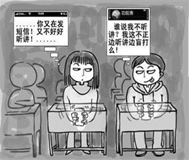题目内容
I’m seventeen. I worked as a box boy at a supermarket in Los Angeles. People came to the counter (柜台) and I put things in their bags for them and carried things to their cars. It was hard work.
While working, I wore a plate with my name on it. I once met someone I knew years ago. I remembered his name and said, “Mr. Castle, how are you?” We talked about this and that. As he left, he said, “It was nice talking to you, Brett.” I felt great, he remembered me. Then I looked down at my name plate. Oh, no. He didn’t remember me at all, he just read the name plate. I wish I had put “Irving” down on my name plate. If he’d have said, “Oh yes, Irving, how could I forget you?” I’d have been ready for him. There’s nothing personal here.
The manager and everyone else who were a step above the box boys often shouted orders. One of these was: you couldn’t accept tips(小费). Okay, I’m outside and I put the bags in the car. For a lot of people, the natural reaction(反应)is to take a quarter and give it to me. I’d say, “I’m sorry, I can’t.” They’d get angry. When you give someone a tip, you’re sort of being polite. You take a quarter and you put it in their hand and you expect them to say, “Oh, thanks a lot.” When you say, “I’m sorry, I can’t.” they feel a little put down. They say, “No one will know.” And they put it in your pocket. You say, “I really can’t.” It gets to a point where you almost have to hurt a person physically to prevent him from tipping you. It was not in agreement with the store’s belief in being friendly. Accepting tips was a friendly thing and made the customer feel good. I just couldn’t understand the strangeness of some people’s ideas. One lady actually put a tip in my pocket, got in the car, and drove away. I was puzzled and didn’t know what to do. Should I d have had to throw the quarter at her or eaten it or something?
I decided that one year had been enough. Some people needed the job to stay alive and fed. I guess I had the means and could afford to hate it and give it up.
小题1:. From the second paragraph, we can infer (推断) that ________.
小题2:. The box boy refused to accept tips because ________.
小题3:. The underlined phrase “put down” in the third paragraph probably means ________.
小题4:What can be the best title for this text?
While working, I wore a plate with my name on it. I once met someone I knew years ago. I remembered his name and said, “Mr. Castle, how are you?” We talked about this and that. As he left, he said, “It was nice talking to you, Brett.” I felt great, he remembered me. Then I looked down at my name plate. Oh, no. He didn’t remember me at all, he just read the name plate. I wish I had put “Irving” down on my name plate. If he’d have said, “Oh yes, Irving, how could I forget you?” I’d have been ready for him. There’s nothing personal here.
The manager and everyone else who were a step above the box boys often shouted orders. One of these was: you couldn’t accept tips(小费). Okay, I’m outside and I put the bags in the car. For a lot of people, the natural reaction(反应)is to take a quarter and give it to me. I’d say, “I’m sorry, I can’t.” They’d get angry. When you give someone a tip, you’re sort of being polite. You take a quarter and you put it in their hand and you expect them to say, “Oh, thanks a lot.” When you say, “I’m sorry, I can’t.” they feel a little put down. They say, “No one will know.” And they put it in your pocket. You say, “I really can’t.” It gets to a point where you almost have to hurt a person physically to prevent him from tipping you. It was not in agreement with the store’s belief in being friendly. Accepting tips was a friendly thing and made the customer feel good. I just couldn’t understand the strangeness of some people’s ideas. One lady actually put a tip in my pocket, got in the car, and drove away. I was puzzled and didn’t know what to do. Should I d have had to throw the quarter at her or eaten it or something?
I decided that one year had been enough. Some people needed the job to stay alive and fed. I guess I had the means and could afford to hate it and give it up.
小题1:. From the second paragraph, we can infer (推断) that ________.
| A.the writer didn’t like the impersonal part of his job |
| B.people can easily start talking with a name plate |
| C.Mr. Castle mistook Irving for Brett |
| D.Irving was the writer’s real name |
| A.customers only gave small tips to |
| B.some customers had strange ideas about tipping |
| C.he didn’t want to fight with the customers |
| D.the store didn’t allow the box boys to take tips |
| A.relaxed | B.upset |
| C.bored | D.surprised |
| A.How I Could Find a Job |
| B.How I Got along with Customers |
| C.Why I Gave up My Job |
| D.Why I couldn’t Take Tips |
小题1:A
小题2:D
小题3:B
小题4:C
试题分析:这篇短文主要讲述了作者在一家超市工作,作为顾客提袋员,收取顾客小费的文章。
小题1:细节理解题。根There’s nothing personal here.这儿没有任何个人的东西。故选A。
小题2:细节理解题。根据. One of these was: you couldn’t accept tips(小费).你不能接受小费。可知商店不允许提袋员接受小费。故选D。
小题3:细节理解题。根据文章意思,当别人给我小费时,我拒绝了,他们会感到不安。故选B。
小题4:细节理解题。根据文章大意可知,作者认为接受小费,有助于互相理解,是一种礼貌行为。商店不让接受小费,使作者很不安得罪很多人,文章最后提出放弃这份工作。故选C

练习册系列答案
相关题目


